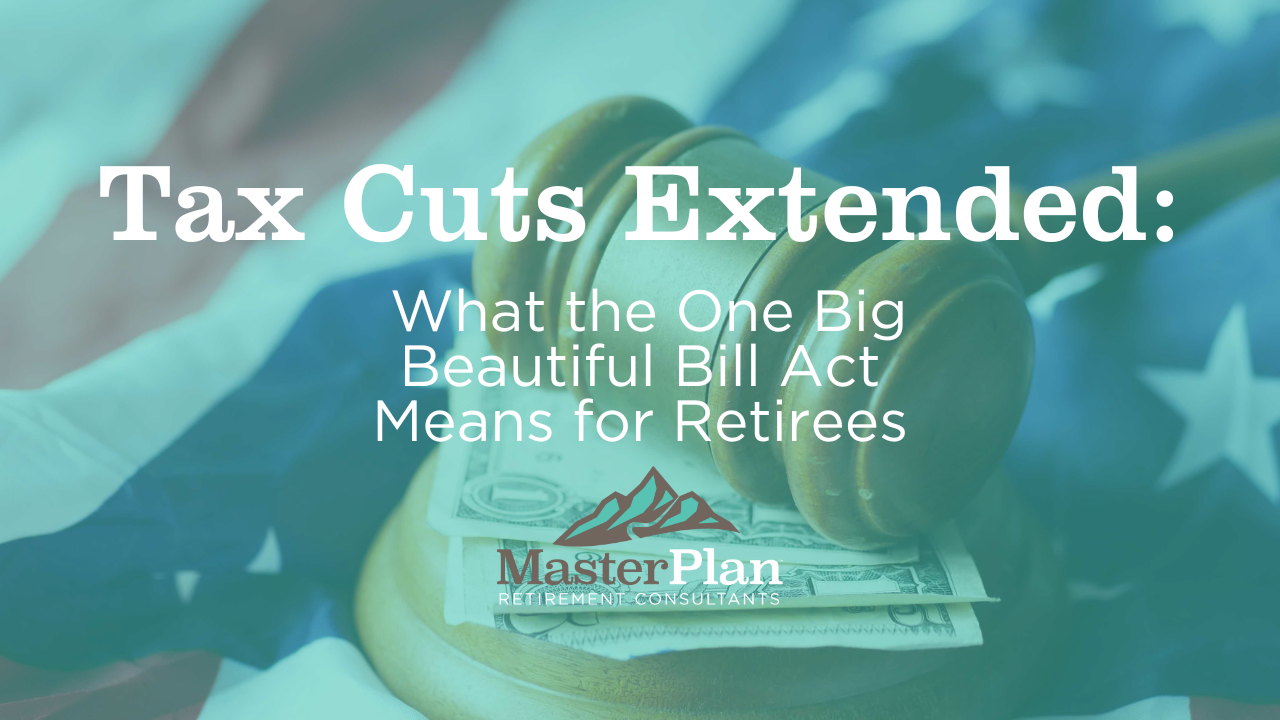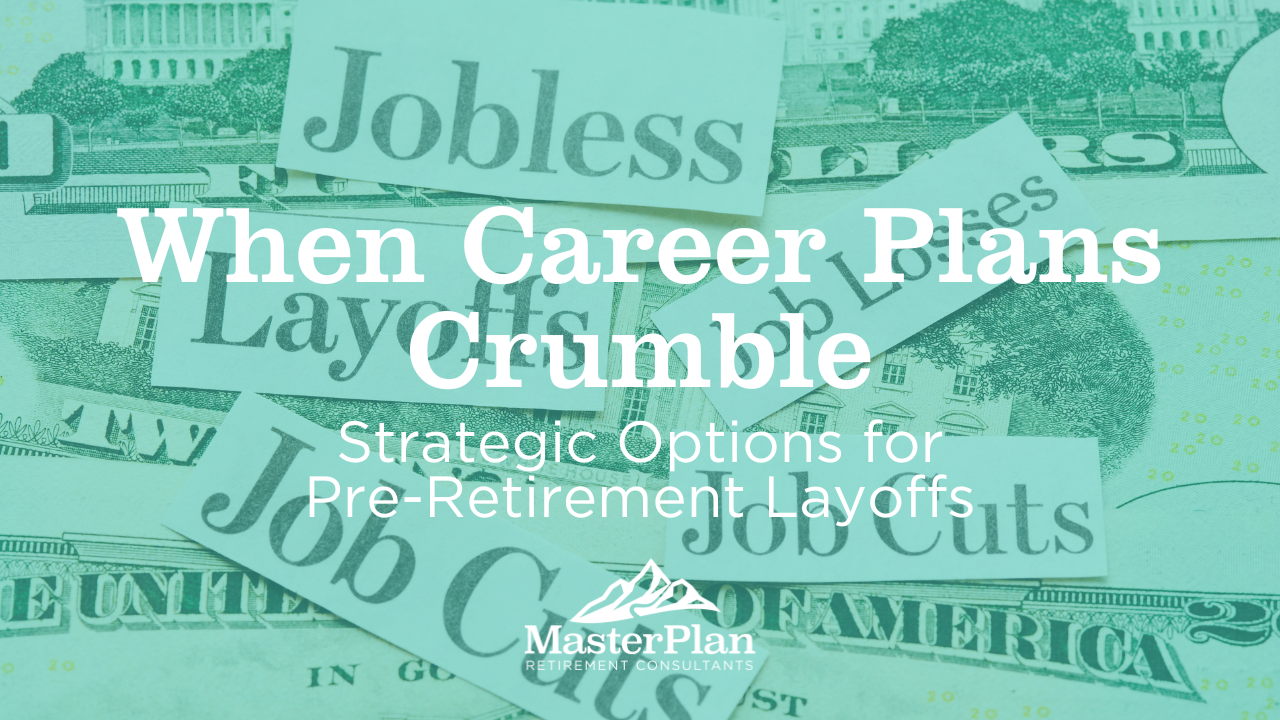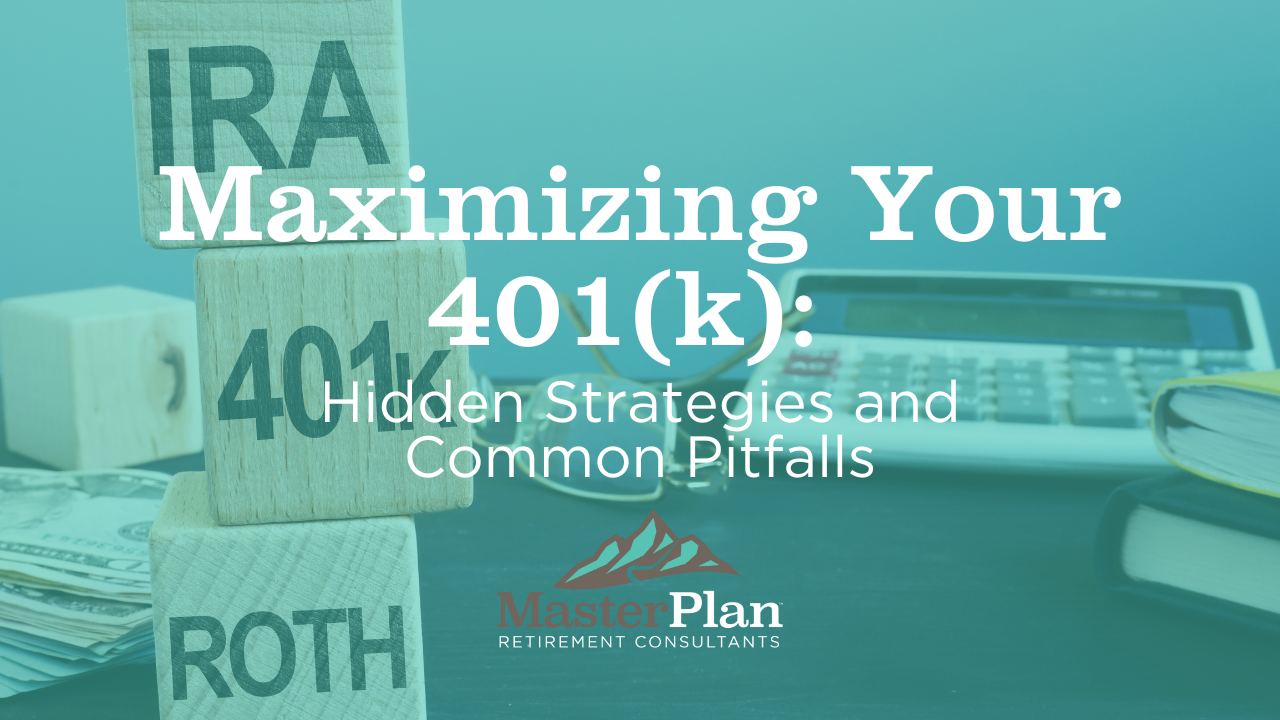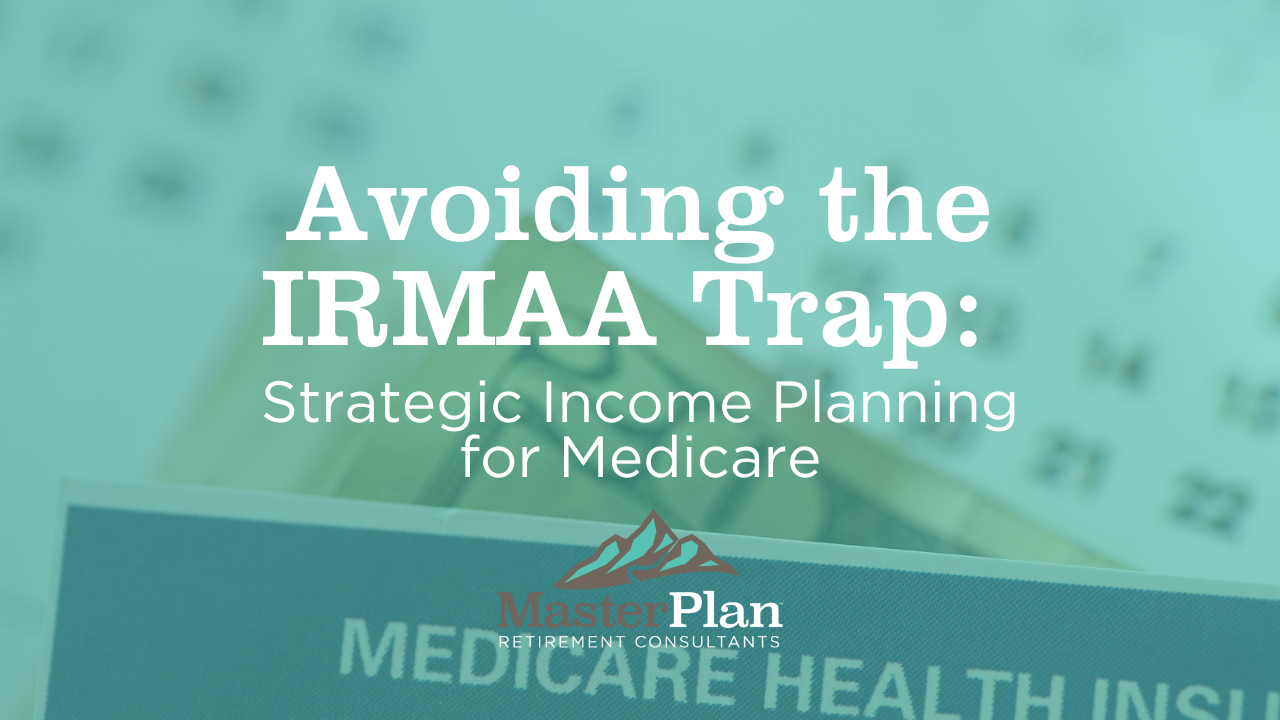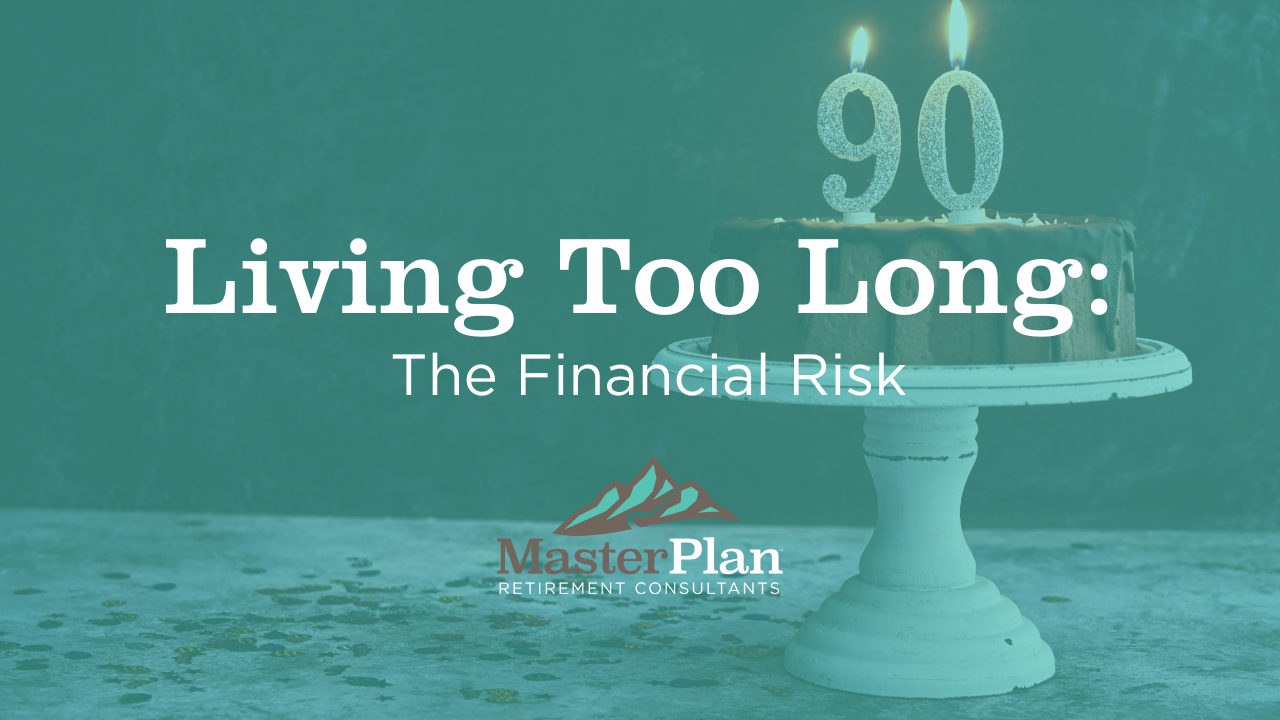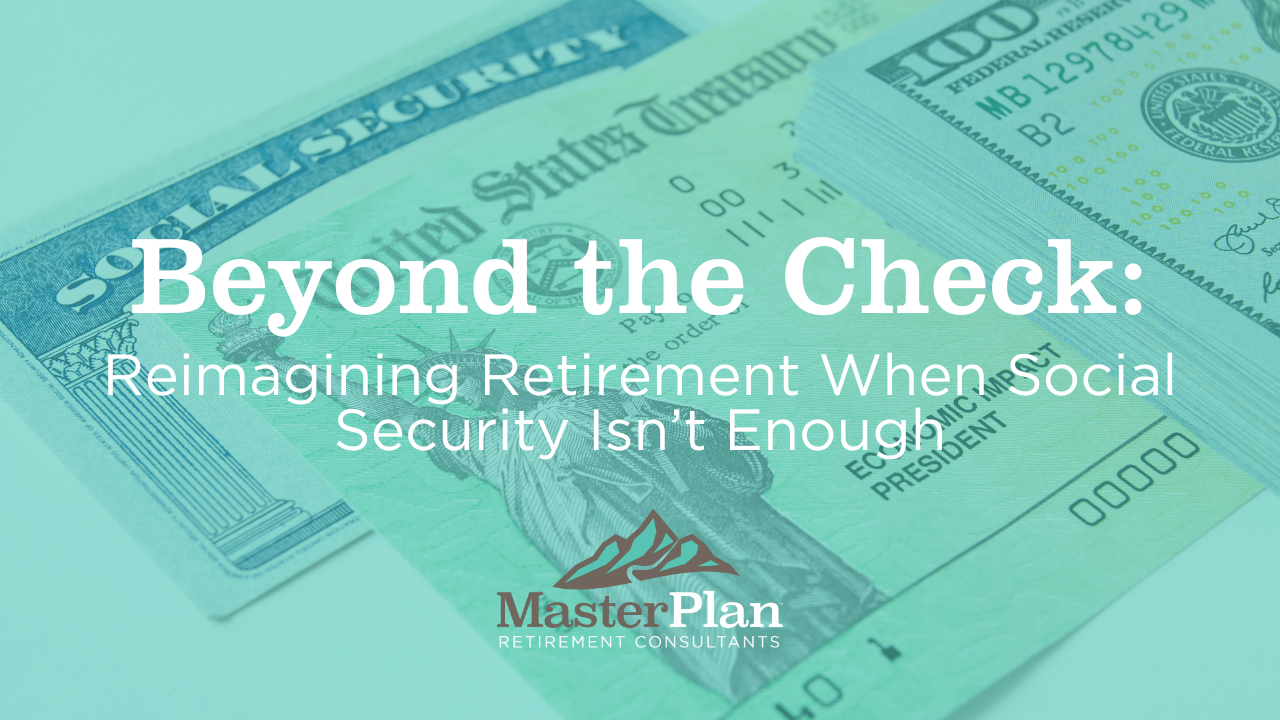Market-proof Your Retirement: Income Strategies for Any Market
On this episode of Retirement Roadmap, Evan and Mark discuss how the traditional rules of retirement planning have changed dramatically in recent decades, calling for new strategies to generate plans for reliable income regardless of market conditions. Increased market volatility since 2000 has rendered the old "4% rule" obsolete, now reduced to 2.8%, while tax implications, sequence of returns risk, and the shift from pensions to 401(k)s create additional challenges.
Evan Fricks:
Do you have a retirement income strategy that works in all markets? Hey folks, welcome back to Retirement Roadmap with Master Plan Retirement Consultants. My name is Evan. With me, as always, retirement planner Mark Fricks. Steep market downturns expose weaknesses in retirement income plans. That was especially true earlier this year when the S&P 500 tumbled some 20% from its high. If you can't pay basic monthly expenses like rent, electricity, prescription costs, food and gas with cash at the ready, you'll have to make a withdrawal from other accounts. The problem: you'll be withdrawing from accounts that hold assets that are worth less than they were before the market sell-off. Mark. In some ways, our company was founded by a failing market.
Mark Fricks:
Yeah, the dream of MasterPlan came in 2008, the Great Recession, when clients were coming into my former firm and just not knowing what to do, because every day we'd come into the office and the market was down again, and down again, and down again and maybe a bump up and then down again for the next five days. And it's not just the fact that they were watching their accounts dwindle I think S&P lost 56% over about an 18-month period but it was the fact that many of them were taking money from those accounts and as they're taking money from those accounts and they're losing money, they were in a position to probably never be able to recover. And so sitting in front, and this is a very personal story for me, sitting in front of these folks that are in their 60s, 70s, even 80s, and trying to explain this away and not really having an income plan, was difficult, and I spent the next year or two just reading and talking to colleagues and trying to figure out what are we doing wrong? And that was the old traditional income market.
The model was hey, maybe get some good dividend paying stocks? Well, dividend stocks are not guaranteed. Ladder some bonds? Well, bonds have really stunk over the last 20, 25 years. So you're talking about a 3% to 4% flow. That's not a lot. And again, even in bad times even the best dividend paying companies can stop dividends, and there's a good percentage of them that So where does your income come from? That was the birthing, if you like that expression, of MasterPlan and where it came from and why. I think income planning is the number one thing we do.
Evan Fricks:
Yeah, and there's a big baby boomer-specific problem. Defined benefit plans transition to defined contribution plans. What do I mean by that? Late 70s, early 80s, companies began replacing pensions with 401ks and with that they did not provide education, they did not provide a means of understanding not only where to invest, but what to do with that money when it's time to actually use it. Not only did they take away the companies', take away their own personal responsibility for that plan to pay in the future, they put it on the employee. You no longer know what exactly you're going to have in retirement. Where it was defined benefit at one point, now you just kind of hope that it builds enough to last once you hit retirement. The other problem, which and I think we'll both agree is the biggest problem, is, all of a sudden you're putting into maybe up to 20, 30 years of your employment, your career, into a tax deferred bucket. So because a portion of that goes back to Uncle Sam, when you withdraw it you also don't know how much actually belongs to you.
Mark Fricks:
Yeah, I'm going to go back to what you said there at the beginning. The education, I think, was the biggest problem. It did not dawn on people that they've taken away one of the legs of my three-legged retirement stool. Now there's still Social Security and there's still retirement savings, but that third leg, which is a very strong leg of a guaranteed pension, many times with the cost of living adjustment was gone and people didn't realize that. And I think the way it was sold.
I remember my first corporate job when, you know, they brought me in and said, hey, you qualify for 401k, and I said what the heck is that? I had no idea and the way they explained it was very poor. And so I picked out one or two funds. I didn't even know what a fund was. I mean, I was like 19 years old and I didn't even know what a fund was. I didn't understand it. And so, yeah, I signed up for it, but I didn't know what I was doing.
And so here, something that was supposed to replace one of the legs of the stool or add to it ended up being the weakest part.
And then tying that back into what you said toward the end there about the fact that every dollar that comes out of that traditional 401k is taxable and if you can tell me what your tax rate is going to be at retirement or in 20 years or whatever, we have an opening for you here at Master Plan to hire you and bring you on. But we don't know. But we do have a pretty good idea that it will be higher and that mortgage you talked about having in your 401k or IRA or whatever can be dangerous. Because, again, we've said this before when you think about the balance in your 401k or IRA, traditional, subtract 20, 30, or 40% from it because it doesn't all belong to you. So what do you do about that? Well, that's where you introduce a tax strategy into that income plan, which is probably the two most important things we do.
Evan Fricks:
So why do I bring up 401ks? Well, for one, the vast majority of baby boomers, their retirement savings are coming from 401ks, which are, generally speaking, the vast majority invested in mutual funds, maybe company shares, the like, but that's market money Meaning. If you are relying on that big bucket of money that is in the market for your retirement income and you have to take withdrawals regardless of where the market is, you are digging into your principal in a down market. We want to take a little bit more of a 10,000-foot view of some concepts before we get into some ways on how to plan for an income strategy that works in all markets.
And the next thing I want to discuss is the 4% rule Mark. So we've talked about this one before. 4% rule is basically a study that was done back in the 90s 94, I believe and it states that at a withdrawal rate of 4%, that's identified as being optimal to last through 30 years of retirement. So if you have a retirement account, regardless of the size, you can withdraw 4% of that account per year and it will last 30 years in retirement.
Mark Fricks:
Yeah, and that was done by Morningstar, one of the leading researchers of investments, and probably every stock that's ever been out there, every bond, everything. So they did that study, like you said, in the mid nineties and that's kind of been the rule 4% and even that's not guaranteed, it's like a 97% chance you won't run out of money with 30,000 a year and that's without increasing your amount coming out.
Evan Fricks:
So if it was $30,000 a year that you needed in retirement, your account, your retirement account, would need to be $750,000. Right, that's that 4% of $750,000. It's funny Articles, even now when I'm browsing around seeing what's popping up that might be a good cool subject to talk about in the show. They're still using rule, 4% rule, still mentioned constantly, and there's a problem with that.
Mark Fricks:
There is a problem with that. They redid the study in 2013. That was after the tech bubble, after the Great Recession, after the lost decade from the year 2000 through 2009. That was the first decade that we were actually in the negative a little bit and redoing the study they came up with. Now it's not quite as smooth. It's the 2.8% rule, right.
Evan Fricks:
Based on Morningstar and their same study that they did, so, 2.8,. You probably have the numbers. I have it right here. Yeah, so 2.8% a year for 30 years means your retirement account can no longer be $750,000. It actually has to be as big as $1,071,429.
Mark Fricks:
So another quarter of a million dollars plus in that account, and that's not taken into account the tax rate, right? Is that clearing 30,000 or gross? That's a gross of 30,000. So what are you receiving based on what the tax rate is? We don't think that's going to change. You know, let's be clear about this. I think that first decade of the new century was not an anomaly. I think it was a kind of a precursor to the way the world is now. I mean, things are different. First of all, it is truly a world economy. Now, what happens somewhere else does affect us. What happens on social media affects us, whether it be an administration throwing out the tariff word, maybe it's a bunch of people just getting together to crowd fund a stock or drive up a stock price. It's computer trading. It's actively managed trading. Now trades are happening in nanoseconds. No longer do we have a broker calling somebody up. Well, I wouldn't say no longer, but it's less often it still exists.
It still exists, yeah, calling you up, leaving them a message I really want to sell this and buy that. You call back the next day, you miss them and before you know it it's four days later. They finally make the trade, whereas the computers that are generating trades are happening instantaneously, and so the price has changed. The premise has changed from a standpoint. So what I'm getting to is the volatility of the market, I think is here to stay, and and maybe even more volatile in the years ahead. So that adds another layer of problems to that income flow coming out. The next rule may be 2.2%, I don't know, but regardless it's still not guaranteed. We think it will last that long, based on market conditions. And so, as I tell our clients, has your money become more efficient or less efficient, and has it become less efficient for producing income?
Evan Fricks:
And I believe we've shared these numbers before, or at least referenced to them, but to give the listeners a bit of a clearer picture on the stock market and the change in volatility. Over the years From 1980 to 1999, the S&P earned an average annual return of 17.75%. That's an average by the way, 17 plus percent. The worst calendar year in those 20 years was negative 9.73%. I can retire in that market.
Mark Fricks:
I think anybody could retire in that market. Just about. It was a great 20 years, yeah, and part of that was because of Reagan coming into office lowering tax rates. That spurred the market. So it was a good two decade period, so tell us about.
Evan Fricks:
Well, so 2000 to 2020, and we're not even including two drops, two big drops from 2020 to 2025. So the numbers from 2000 to 2020, the S&P earned an average annual return dropped down from 17 to 6.06% average annual return, with the worst year being a negative 38.49%.
Mark Fricks:
Which was, of course, 2008. Amazing. So, 6% versus almost 18%. It's a third of an average barely beating inflation of 3.5% to 4%. But also, again, the wide swings. One of the things we share with our clients is a comparison between the two markets, and just the swings of the last 20 years versus the swings of 80 to 99. It's just so evident of the differences that's going on. And then the worst year being less than 10% loss versus 38 plus percent loss huge, and that's why people's lives were changed in 2008 through 2011. People went back to work, people delayed retirement, a lot of people laid off. It was a devastating time and will it happen again? I don't know. You know we had the Great Recession, the Great Depression. I don't know, but I do think volatility is here to stay. Yeah, absolutely.
Evan Fricks:
And, folks, this is a real problem. Most people have these issues that we're discussing. If they've been working a regular kind of nine to five career, they've got those 401ks or whatever. If you've got tax deferred retirement accounts, you do have an issue, a need for an income plan. So if you would like to speak to an advisor concerning your own retirement remember we offer those complimentary consultations just for you you can go to our website, masterplanretire.com, click a schedule now button, go directly to our calendar, find a time that works best for you. You can also call our office at 770-980-9262.
Mark Fricks:
What's great, by the way, about that consultation is some of the things we're talking about will reveal if you have a problem. Do you have a problem if taxes go up? This report will reveal that. Do you have a problem if we continue with the history of our bear markets, which we will? Bear markets occur an average of every five years, with an average drop of over 30%. Do you have a bear market strategy? It's not important if you're 25 or 35, you're putting new money in, but if you're within five, seven years of retirement and you have a 30 or 40% drop, you're going to be further away from retirement. So what is your strategy? Develop it before retirement. Develop it three, five, seven years before you retire. And I've just named two of the reports. There's several other reports that will reveal again where your dangers are. So take advantage of that masterplanretire.com.
Evan Fricks:
All right, so we've discussed a few different concepts. One, just the volatility of our markets, the fact that we've got a lot more losing years, or the average loss is a lot more the risk of sequence of returns. Now, that's withdrawing funds while asset values are low. So if you're withdrawing from your market account when the values are already low, you're locking in your losses, you're depleting your savings faster than expected. We talked about the 4% versus 2.8% rule. Why do we discuss all that?
Oh, also taxes. What's your tax bracket in retirement? You've got, you know. These are all gross numbers, meaning we've not taken taxes out yet. So if you've got social security, maybe another source of income or other withdrawals we were only talking about $30,000 a year that income rate is going to continue to grow and tax your withdrawals from your tax deferred accounts even more, okay. So, dealing with retirement income shortfalls Again, most of us start with one big bucket. The first thing we got to do, though, is reduce our withdrawals early on. If we can avoid locking in those losses by withdrawing less during a downturn, consider delaying large purchases, simple budgeting, discretionary spending in the first few years or and Mark, I think you'll like this one better plan your income strategically to come from a guaranteed source that is not jeopardized by market fluctuations.
Mark Fricks:
Yeah, it's like adding that leg we lost. That pension leg we lost. We replace it with what we call a personal pension plan. That's right, and so you've got to be very careful here. You want to work with a fiduciary, but it is a very specific type of annuity. A lot of people hear about an annuity and they've heard stories. The problem is that there are a lot of bad annuities out there, and so you got to be very careful. Which one would you use? But what we want to use is one that has a fixed principle. In other words, the principle can't go down, only growth on the upper side. That follows the market up, so we can get better returns than an old fixed annuity. But also, I think, more importantly, that it can provide has the ability to provide joint income if it's a married couple. So if one passes away, the income does not change. Some of them actually increase almost every year, so it keeps up with inflation. But really the final piece is low fees, and if you pass away and there's still money in it, it's not lost, it goes to heirs, and so it's all the different things that used to be wrong with annuities.
And I love to ask people do you have an annuity. They say, well, no. I say, do you have social security? Yes, I qualify for social Security. You have an annuity. Annuities are built off of the language and the concepts of annuities. Social Security is, I'm sorry so.
Annuities have been around, as you've mentioned before, since ancient Roman days, supplying pensions, I think, for retired military, and entered this country in 1759. So inherently they're not bad. It's the one. It's kind of like a car. You buy the right car for the right purpose, for your purpose, it's great. You buy a junkie car or a car that doesn't fit what you need, it's not great. So just make sure again, you work with a fiduciary. I love that. Guaranteed income, no matter what the market's doing, no matter what's going on in the world, you've got an Aplus rated insurance company that has five pillars of strength, you know. So the best companies don't fail. You don't have to worry about that check not coming. You can pay that electric bill. And I'm not saying I'm not recommending an annuity for everybody out there, for sure, but it is part of our education process and part of our planning. If it's the right fit for the right person, an an annuity is not a retirement plan.
Evan Fricks:
It is a tool. Out of a tool bucket that has other tools with specific jobs. Which brings us to our second strategy, is using a bucket strategy, especially for non-income withdrawals. But let's look at that for a second. Most people again have a big 401k, maybe a few big IRAs, but they've all got that one job and that's just to grow. In retirement, you can't have one big bucket doing all the jobs you need to accomplish in retirement, whether it's short-term, long-term income, short-term, long-term growth, tax-efficient, tax-free income, whatever. You can't do it all in one bucket. So we divide our assets into buckets.
This is a very simplified version of this concept but, for instance, short-term income savings, conservative actively managed portfolios, potentially money markets that's one to two years of expenses to five year as far as the risk tolerance, and then long-term would be more aggressive, especially if you need some long-term growth for future long-term care needs or just to keep up with inflation. That could be five plus years more aggressive. You're able to be more aggressive because that bucket's not meant to be touched for five or 10 years. So we know we can allow a little bit more volatility and aggression in some of those buckets. And again, an annuity is just another bucket that can provide guaranteed income so that when we need that paycheck to come every month, it doesn't matter what the market's doing. Now, remember, the answer is not more accounts, but accounts with specific jobs.
Mark Fricks:
Yeah, one of the stories. I don't think I've told this one on the radio. I came up with this one the other day, so I've been hired as the new coach of the Atlanta Falcons Congratulations.
And the reason they hired me is because I have this great new concept I want to take the best athlete that you can have, which may be like a wide receiver or a cornerback, but I'm going to fill the field with them. They're all going to be that same kind of athlete. Am I going to win? No, all going to be that same kind of athlete. Am I going to win? No, because that particular athlete may be a great athlete, but can they pass the ball? Can they block? Can they hike the ball? Can they punt? No, I want a specific type of player for each position to make the best team I can possibly have.
And so it's the same thing with your money. I've got one job, like you said, while I'm working, that's to grow. But as I get closer to retirement, all these different jobs and we have clients that have six, eight, 10, 12 different buckets, everyone with a different job. And you know, as you know, probably at least once a day I'll get a call or an email from a client saying, hey, we need to repair the basement, we need to go to Europe or whatever. I want to go to Europe, we need $10,000.
We don't just pull money out of a bucket. We look at the buckets and see which ones has profit, which ones has protected principle. What's the best place to take it from? Do we want a tax-efficient withdrawal or a taxable withdrawal, depending on their situation and the future plans? So it is not just hey, let's pull money out of that big 401k or whatever. Very strategic and, in these kind of days, even more strategic. Yeah, and what's great is these portfolios you're talking about. Every one's a different flavor. The 401k is all vanilla or chocolate. I want a chocolate, I want a butter pecan, I want a pistachio. Why? Each one works different in a different market. We've got several of our portfolios right now that are up in this market because they're designed to work the opposite of the market, whereas others are down because they're more growth oriented. That's okay. They'll come stormy back next year when the markets recover, and so we've got different again, different ways of growing and protecting money that all become part of that plan.
Evan Fricks:
Yeah, it lets you draw from safer buckets while waiting for markets to recover. Really simple, yep. Try to tap non-market income first. So Social Security, pensions, cash savings or annuities those are more dependent and dependable during volatile markets, even precious metals, even precious metals Another thing that we put some of our clients in as well. We've got precious metal buckets, whether it's physically held or within IRAs as well. We have both possibilities, just depending on the need. Again, it's very specific to you and your situation and what you need. But precious metals are great in weird you need, but precious metals are great in in in weird rocky markets. They're also good wealth insurance because you know we, we know the that the dollar does not. Uh, it's not based on anything anymore right not back anything.
Mark Fricks:
As an example 2008, uh, when the market was down 56 over an 18 month period, a combination of gold and silver was up 500%. That's why they call that wealth insurance, because it's going to do the opposite of the market long term. I'm not talking about every day. The market goes down, gold goes up necessarily, but we know over the last year gold's up substantially over 30 something percent.
Evan Fricks:
We just hit a new high recently. That's what happens in rocky markets.
Mark Fricks:
Uncertainty generates returns in gold and silver, and world uncertainty does as well. So just another bucket. You can't have everything in gold. You can't have everything in real estate. Again, it needs to be spread out so that there's always something making money in the market. It's our job and our money manager's job to find what that is.
Evan Fricks:
There's a lot of other considerations as well, as we run out of time. We've covered some of the big concepts of what we deal with, but you also might consider delaying Social Security if possible. Waiting increases your monthly benefit. If you can delay until 70, that'll maximize your guaranteed income, which helps reduce reliance on market-based assets. We've talked about this before as well. Consider part-time work. Even part-time income can greatly reduce withdrawals during the bear market. It gives your portfolio more time to recover. Reallocate investments cautiously, preferably with a financial professional. Maintain your target asset allocation. Avoid panic selling. Yeah, exactly, mental shift Retirement as a long-term phase. So remember, retirement can last 25 to 30 years or more. A bear market at the start is not ideal. That is certainly concerning, but your portfolio still has time to recover if withdrawals are managed smartly.
Mark Fricks:
Great, great, great episode. Thanks for joining us and until we see each other next time, plan well and prosper
This was Retirement Roadmap Radio with Mark Fricks of MasterPlan Retirement Consultants. To schedule a complimentary consultation, go to masterplanretire.com or call 770-980-9262.
All matters discussed during this show are for informational purposes only. Each individual situation may vary and the opinions expressed here may not apply to everyone. Materials presented are believed to be from reliable sources and no representations can be made as to its accuracy. All ideas and information should be discussed in detail with one of our qualified representatives prior to implementation. Advisory services offered by MasterPlan Retirement Consultants a Registered Investment Advisor in the state of Georgia, Mark Fricks and MasterPlan Retirement Consultants are not affiliated with or endorsed by the Social Security Administration or any other government agency.
